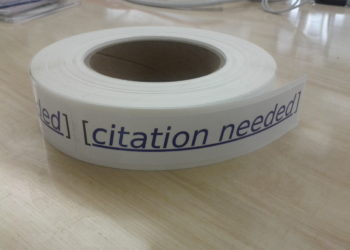
A couple of recent posts on this blog have been aimed at increasing researchers’ understanding of publishing and publishers. As it happens, around the time they were posted, I was in the middle of a series of interviews with researchers, and they in turn were flagging challenges that they wished publishers understood better. I thought therefore it might be useful to summarize and paraphrase some of the main points raised, along with thoughts about how such issues might be addressed. This is a snapshot, a starting point for further discussion, not a comprehensive list. Further contributions from researchers are welcome in the comments;
Although I’m not a researcher myself, I’ve presented the views of those I’ve spoken to in a first person voice because it feels more human than talking about “they” and “them” .
ASPIRATION: We want things to be more streamlined.
- Context: Publishing is important but it’s only one activity of many that we must undertake — teaching, researching, managing people and projects. Your processes are painful, your systems overly fragmented, your interfaces unnecessarily different. Why do you all do things separately and differently? Can’t you be more integrated / automated?
- Possible solutions: Yes, in attempts to differentiate their services, publishers often reinvent the wheel — the ways in which one’s system might be better than another’s aren’t always sufficiently beneficial to outweigh the disadvantages to a researcher trying to complete the same task in fifteen different ways. But publishers do collaborate on many shared services. In some cases, this collaboration takes the form of vital “plumbing” (often invisible to researchers, and admittedly sometimes solving problems that are more keenly felt by other parties, such as institutions). In other cases, through grants or early adoption, publishers support the development of cross-publisher services with more direct researcher value; in my last post, I looked at this trend of publishers investing in workflow tools. There is a sense that publishers are thinking more strategically about where being different is a good thing, and where in fact they have more to gain (economies of scale) by collaborating with others to “commoditize” — and therefore streamline — some functions. Publisher readers: what functions might in future be shared and streamlined?
ASPIRATION: We want wider recognition for our efforts.
- Context: We’re struggling for visibility in a crowded, competitive environment. Our supervisors’ / institutions’ mechanisms for evaluating us are out of date. We spend a lot of time contributing to the publishing process in ways that ultimately benefit the overall system but for which we personally don’t get recognition. Ideologically, we want to keep doing our bit; in reality, our time is so pressured that have to weigh each non-core task. Can you help us surface and quantify these efforts, and help us influence our institutions in taking them seriously?
- Possible solutions: Publishers already support — either as investors or customers — services such as Publons which provide public recognition for researchers’ reviewing activities (and which are then working with institutions to begin the not insignificant task of trying to expand the bases of institutional evaluations). Publisher support (in terms of expertise as well as money) has also been crucial to the development of ORCID, which both directly enables researchers to get credit for their work, and participates in projects such as CRediT which is working towards a universal way of “badging” researchers’ contributions (e.g. as a reviewer, or coder, or for supervising projects or winning funding, etc). Publishers have also supported — again, either as investors or customers — the development of altmetric services which aim to surface and summarize discussion around publications; perhaps the badging and altmetrics concepts can collide to help institutions evaluate, recognize and reward researchers’ wider contributions.
ASPIRATION: We don’t want to feel exploited; we want to trust that you share our goals.
- Context: Putting institutional evaluation processes to one side, we publish so that our work can be found, read and applied by others. We want to feel that is your primary raison d’être too but feel sometimes that publishing has become an end in itself, rather than a means. As we scrape together budget for staff and equipment, it is at worst soul-destroying and at least infuriating to think of the immodest surpluses and profits made by some publishers, which we feel are disproportionate to the value that you add versus the value we add ourselves. Our expectations are changing — for example, we want to get our work out there more quickly — and while we aren’t (all) demanding that you throw the baby out with the bathwater, we do want to feel like you’re taking our evolving needs seriously, and that you’re prepared to scrutinize the fitness for purpose of each part of the publishing process, e.g. in the context of new technologies. We are losing trust in your ability to deal transparently with us or to put the needs of scholarship and research above all else.
- Possible solutions: Publishers could articulate better the ways in which they do explore and respond to researchers’ needs, but PR is a defensive response and perhaps a touch solipsistic: ideally one should show not tell, i.e. be functioning in a way that self-evidently reflects shared values, and changing researcher needs and expectations. Taking a hypothetical approach to innovation (“suppose we were starting from scratch: what new approach would we invent to deliver what our customers want”) or using reversal techniques (“what things could we do that our customers would hate,” and then see what the opposites are) can make it easier to envision paths around real-world obstacles. Where there’s a will, there’s a way — the question uppermost in researchers’ minds is whether publishers really have that will.
In adding your comments, note that I’m aiming to do a follow up post pulling together any more themes that emerge. To that end it would be helpful if you could try to echo the structure I’ve used (aspiration > context > possible solution), so that the focus is on what we might actually do to improve things, rather than just how wrong things might be.
Discussion
18 Thoughts on "Three Things Scholarly Publishers Should Know About Researchers"
Speaking as a researcher, here is my suggestion:
Aspiration: I want to do research, not rewriting.
Context: Publishing an article too often requires multiple revisions for poor reasons, wasting my time. First there are the pointless detailed style and format requirements that vary from journal to journal.
Then there come the nitpicking review comments. My impression is that reviewers and editors think that a good review has to call for changes. The best review is one that simply says “This is good enough for us.”
Possible solutions: Drop all style and format requirements. Just publish what is submitted if it is readable.
Instruct reviewers as follows: “Do not ask how I can make this better, just ask is it good enough? Only ask for changes that are absolutely needed to make the article acceptable.”
As a researcher, I cannot agree with that. Style requirements are there for a reason, and so are standardized nomenclature. They are there to enhance readability and clarity.
What I do perceive as a problem, however, is that there are some unnecessary variations in what is standard. I accept writing in American English to American journals, and British English to European journals. However, when it comes to thing like units, usage of symbols as such, there are internationally accepted standards, put down by bodies like BIPM, SI and various “unions”. I do find it annoying that some journals follow these, whereas others do not. I have even experienced being instructed to change what I have written – fully adhering to international standards – to some journals own pet standard. That I do not find acceptable.
As to the issue of making a paper better: when I am a referee (which is very frequently) I really do see it as a responsibility to try to make the paper better. When I am a author (relatively frequently), I appreciate comments that make the paper better. Yes, it is annoying and a chore having to go over the manuscript again, and yes sometimes the comments are unnecessarily nitpicking, but in the end I *want* to be a perfectionist when it comes to my own papers, and I want the stuff published under my name to be as good as it can be.
Anders, perhaps we need a way to specify whether we want perfecting comments or not. I much prefer doing more research to perfecting my papers. I view journal articles as mere notices, that certain work has been done, not as bodies of information.
Fair enough. We could also have different types of journals – the quick-and-dirty kind and the perfectionist kind. Could the megajournals be described as “quick-and-dirty” (and expensive)?
The megajournals are based in an acceptance criterion that does not include importance. The quality of the writing in not relevant. It might be interesting to try a journal advertising no rewriting unless necessary for acceptance. This would speed up publication as well as reducing hassle. Existing journals could adopt such a policy.
Nice list Charlie. I don’t know how much streamlining can really happen given the wide variety of publishers that exist. I know that the submission process is always a target for author frustration. I can see where it would be helpful to authors if there was one standard system but the systems are built/configured often times around the editor desires as well. For example, some editors are still sticklers for manuscript format while others are fine with a free for all on the first round. For journals that allow editors to make those calls, you will see variation.
Consolidation of tools also means consolidation of vendors and that is actually NOT a good idea.
Sharing reviews between journals is another place where authors think we can streamline but this is extremely unpopular with editors. Editors are, of course, academics in the same communities as the authors so I guess my question would be, do these people not talk to each other? Do editors of journals not get feedback from the researchers in their institutions? Are there no discussions at the coffee room about the process of publishing?
Regarding recognition, publishers can certainly provide whatever documentation (letters, badges, updates to profiles) showing the contributions of editors, guest editors, reviewers, etc. Publishers do not have any influence over whether review or tenure committees see that as valuable.
By and large, I fell like publishers respond when authors and reviewers actually tell us what they want or what they need. The truth is, in my experience, they don’t usually tell us. Having more dialog between publishers, editors, and the authoring community is a great idea but very difficult in practice. As you said above, being an author is a tiny part of what a researcher does and the amount of time they have to dedicate to learning the system is limited.
Reading this and other contributions to the Scholarly Kitchen makes me realise that just as publishers are pretty disparate lot in terms of outlook, practice and motivation, so too are researchers. We are not all aiming for the glittering prizes at the top of some STEM subjects. As I am retired, but still research active in a specialist field with a relatively small but very committed readership, I have a very different take to those who now have to scrabble just to stay in the game at all. OK, I can be written off as a dinosaur, but I appreciate precisely the non-automated relationships with editors, reviewers and publishers that used to be the norm. There are still journals (respectable and featuring in the TR indices) where I can send text, figures etc direct to a human being with a covering letter (and in case there is doubt, I do, of course mean send electronically, not hard copy). They are diminishing in number. As an associate editor and as a reviewer, I hope I still provide the personal touch, but I have noticed that editors and publishers now tend to push on features that might enhance rapid citations. In my field there are many papers that do not get cited much in a two year period, but have very long half-lives.
Many researchers who are not going to make earth-shattering discoveries are nevertheless contributing usefully to the sum of human knowledge and understanding. Many will have no access to funds to pay for Gold OA. Others may well lack institutional affiliation. While I appreciate the dangers of “old boy networks etc, some of the relatively old-fashioned journals that had page charges would almost always waive them for me when they were told that I had no institutional source of funds.
There are plenty of things wrong with the whole business of research, job security and equity. I don’t think that publishers are the principal sinners, but the mechanistic trend makes me glad I no longer compete, but saddens me both on behalf of my much younger co-authors, and in terms of the implications for scholarship more generally.
Thanks for an interesting post, and thanks also to the chefs who posted the correlated (or anti-correlated) post. This subject interests me. I am a researcher. I have never been a publisher. The nearest I have come is to having been editor for journals for a long time, and having been involved in the governance in some journals vis learned societies.
Many times have I heard researches say that the publishing business do not understand how research works, and many times have I heard representatives from publishers complain that researchers do not understand how publishing works. My personal take is that both these worries are somewhat exaggerated, and that solutions to them should exist. As far the real existence of misunderstanding goes, I must admit that I think it more common that researchers do not understand publishing than the opposite. There are many who are employed in the publishing business who have been active researchers, but there are not so many researchers with experience in publishing. Besides that, many scientists are not really interested in publishing to a greater extent than they want to use it as an important tool for doing their job, without having to bother too much about the industry behind the fabrication of the tool.
I think a list like the one Charlie present could vary widely depending on what scientists one asks. Scholars do have a tendency to have contrary opinions. Personally, I am not that bothered about any of the three issues raised in the post. I agree that in is important that the submission process is simple, but I don’t care so much if different publishers solve the problems differently – as long as don’t have to bother much with technicalities when I submit or review.
I think this was more an issue at the beginning of the digital age and online submissions. Now, most journals that I deal with have gotten there act together. I should also say that things could be very much worse before the digital age. For the very first scientific paper for which I was a co-author (probably in 1987 or 1988), we received the proof in an ordinary letter, and were instructed to answer within 24 hours by either telephone, telex or cable. Fax was not authorized, and forget about digital. I am glad we have advanced since then.
One thing I would like publishers to acknowledge more is the diversity of science. The demands of the research community can vary widely between different subjects, and also between different subfields. It happen that publishing house (and even more so political decision makers) believe the on size of publishing model can fit all, while the truth is that that is very far from the case. Lately, I get the impression that the entire industry is moving in a direction that would better accommodate the demands of biomedicine and life science, and this is often not the ideal solutions for other field.
The third issue in Charlie’s post could be seen as a misunderstanding by the researchers of the publishing industry. Unfortunately, there exits a prevalence for a mistrust of publishers among scientist, and in particular large and commercial publishing houses. Some of these concerns may be well funded, but far too many are akin to conspiracy theories. I believe the key to tackle this problem with is communication, as is the case with most inter-personal problems. I enjoy the “Scholarly kitchen”, but I don’t know any other scientist colleague who reads it. It is mostly a blog by people in the publishing industry, for people in the publishing industry. There is nothing wrong with that, but other things are needed.
What I would humbly suggest to publisher is to communicate directly to scientists. Go to conferences, visit labs and campuses, and address researches face to face. And then do it some more. Talk to the active researchers, make serious efforts to understand what their issues are, and explain you point of view. The thing that must be avoided is a widening gorge of ignorance between the two communities.
One thing I would like publishers to acknowledge more is the diversity of science. The demands of the research community can vary widely between different subjects, and also between different subfields. It happen that publishing house (and even more so political decision makers) believe the on size of publishing model can fit all, while the truth is that that is very far from the case. Lately, I get the impression that the entire industry is moving in a direction that would better accommodate the demands of biomedicine and life science, and this is often not the ideal solutions for other field.
I would take this statement even further–the more time I spend with Humanities researchers or Social Science researchers, the more I realize how different things are, and how poorly we serve these communities when we generalize everything as being like biomedicine. I know I’m guilty of this bias and am working to correct it, but industry-wide, I think that focus remains, largely because of the enormous levels of funding in that area.
I totally understand that the industry wants to follow the money. I think I would do to. However, one has to understand that this will create a discord, and it is important for science that some publishers take all scientific genres seriously and cater to their needs. Acknowledging that biomed-type publishing may not be suitable at all for some fields, as David do, is a good start.
Actually, Charlie, there has been quite a bit of automation, ranging from submission systems to reviewer selection algorithms. Perhaps these have aimed at publisher efficiency, not author efficiency.
As someone who used to submit papers by printing out a stack of manuscripts and having a professional photography laboratory assemble my composite figures (after adding letraset labels to each), paying for a stack of printouts to go with each submission, Fedexing a huge stack to the journal, getting responses from the editor by mail, serving as a peer reviewer and getting a letter asking if I would review a paper, getting the paper by mail and returning my comments the same way (eventually by fax), I would say, no, you are wrong. Things are much more efficient for authors.
I think you are referring to the Internet, which publishers did not create.
Sorry, no. The internet was around for quite a while before publishers began accepting papers electronically and creating bespoke systems to do just that. I had an email address and trolled on UseNet for years while still printing out stacks of figures by hand.


